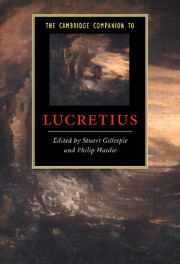Book contents
- Frontmatter
- Introduction
- Part I: Antiquity
- 1 Lucretius and Greek philosophy
- 2 Lucretius and the Herculaneum library
- 3 Lucretius and Roman politics and history
- 4 Lucretius and previous poetic traditions
- 5 Lucretian architecture: the structure and argument of the De rerum natura
- 6 Lucretian texture: style, metre and rhetoric in the De rerum natura
- 7 Lucretius and later Latin literature in antiquity
- Part II: Themes
- Part III: Reception
- Dateline
- List of works cited
- Index of Main Lucretian Passages Discussed
- General Index
7 - Lucretius and later Latin literature in antiquity
from Part I: - Antiquity
Published online by Cambridge University Press: 28 May 2010
- Frontmatter
- Introduction
- Part I: Antiquity
- 1 Lucretius and Greek philosophy
- 2 Lucretius and the Herculaneum library
- 3 Lucretius and Roman politics and history
- 4 Lucretius and previous poetic traditions
- 5 Lucretian architecture: the structure and argument of the De rerum natura
- 6 Lucretian texture: style, metre and rhetoric in the De rerum natura
- 7 Lucretius and later Latin literature in antiquity
- Part II: Themes
- Part III: Reception
- Dateline
- List of works cited
- Index of Main Lucretian Passages Discussed
- General Index
Summary
Parcus deorum cultor et infrequens, insanientis dum sapientiae consultus erro, nunc retrorsum uela dare atque iterare cursus
cogor relictos: namque Diespiter igni corusco nubila diuidens plerumque, per purum tonantis egit equos uolucremque currum,
quo bruta tellus et uaga flumina, quo Styx et inuisi horrida Taenari sedes Atlanteusque finis concutitur …
I used to worship the gods grudgingly and not often, a wanderer, expert in a crazy wisdom, but now I am forced to sail back and once again go over, the course I had left behind. For Jupiter who usually parts the clouds with the fire of his lightning has driven his thundering horses and flying chariot through a cloudless sky, shaking the dull earth and restless rivers, the Styx and the fearsome halls of hateful Taenarus, and the Atlantean limits of the world.
(Horace, Odes 1.34.1-12, transl. West 1995)Horace recants the ‘madness’ of Epicurean philosophy, which teaches that the gods take no part in the affairs of the world. The poet is forced to reverse his position after witnessing a thunderbolt from the blue, a display of the power that Jupiter wields throughout a universe whose limits are sketched in the panorama of the third stanza. That vision, based on a description by the early Greek poet Hesiod of the cosmic effects of the battle between Zeus and the monstrous Typhoeus (Theogony 839-41), implicitly corrects the vision at the beginning of DRN 3 of the peaceful and remote abode of the gods (itself modelled on another early Greek description of the divine, the calm of Olympus at Odyssey 6.42-6) and of a universe marvellously empty of all but the atoms eternally tumbling through the void.
- Type
- Chapter
- Information
- The Cambridge Companion to Lucretius , pp. 111 - 128Publisher: Cambridge University PressPrint publication year: 2007
- 9
- Cited by

